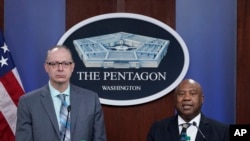PENTAGON — Defense Intelligence Agency officials are warning of "dramatic" increases in the pace and scope of space operations by competitors, with China and Russia growing their in-orbit space assets by 70% since 2019.
"Russia and China, our primary strategic competitors, are taking steps to undercut the United States and our allies in the space domain," DIA Defense Intelligence Officer for Space and Counterspace John Huth told reporters at the Pentagon on Tuesday during the release of the agency's unclassified "Challenges in Security in Space Report — 2022."
Since the first "Challenges in Security in Space Report" was released in early 2019, competitor space operations have increased across nearly all major categories, including communications, remote sensing, navigation, and science and technology demonstration, according to Huth.
"Space is being increasingly militarized," the latest report says, as "China's and Russia's counterspace developments continue to mature … and orbital congestion has increased."
China and Russia view space as a "requirement for winning modern wars," Huth added, with both nations trying to develop a means to exploit the perceived U.S. reliance on space-based systems.
When asked by VOA whether China or Russia was the more dominant competitor, Huth cautioned he would not "take his eye off either one."
In a white paper published by Beijing’s State Council Information Office in January, China called the space industry "a critical element of the overall national strategy, and China upholds the principle of exploration and utilization of outer space for peaceful purposes."
The mission of China's space program, the white paper said is “to explore outer space to expand humanity's understanding of the earth and the cosmos; to facilitate global consensus on our shared responsibility in utilizing outer space for peaceful purposes and safeguarding its security for the benefit of all humanity.”
The paper went on to say its program is intended “to meet the demands of economic, scientific and technological development, national security and social progress; and to raise the scientific and cultural levels of the Chinese people, protect China's national rights and interests, and build up its overall strength.”
DIA Senior Defense Intelligence Analyst for Space and Counterspace Kevin Ryder added that due to greater economic advantages, China has increased its space capabilities while putting more financial and military effort toward their development.
"Russia, on the other hand, is more streamlined due to other modern military modernization efforts for the country," according to Ryder.
This newly released edition of the DIA space security report includes a spotlight on Chinese and Russian moon and Mars exploration.
China has launched a robotic lander and a rover to the far side of the moon, along with an orbiter lander and a rover on a mission to Mars.
Russia has discussed partnering with China, the EU and the U.S. to achieve its lunar aspirations, and Moscow signed a memorandum of understanding in March of last year to work together on the International Lunar Research Station, according to the report.
Ryder said China's and Russia's interest in exploring the moon and Mars should be viewed as national security concerns.
"Both nations seek to broaden their space exploration initiatives together and individually, with plans to explore the moon and Mars during the next 30 years. And if successful, these efforts will likely lead to attempts by Beijing and Moscow to exploit the moon's natural resources," Ryder said Tuesday.
In addition to China and Russia, the report warns that lesser threats Iran and North Korea will focus on ramping up capabilities to counter space-based communications and navigation such as GPS.


